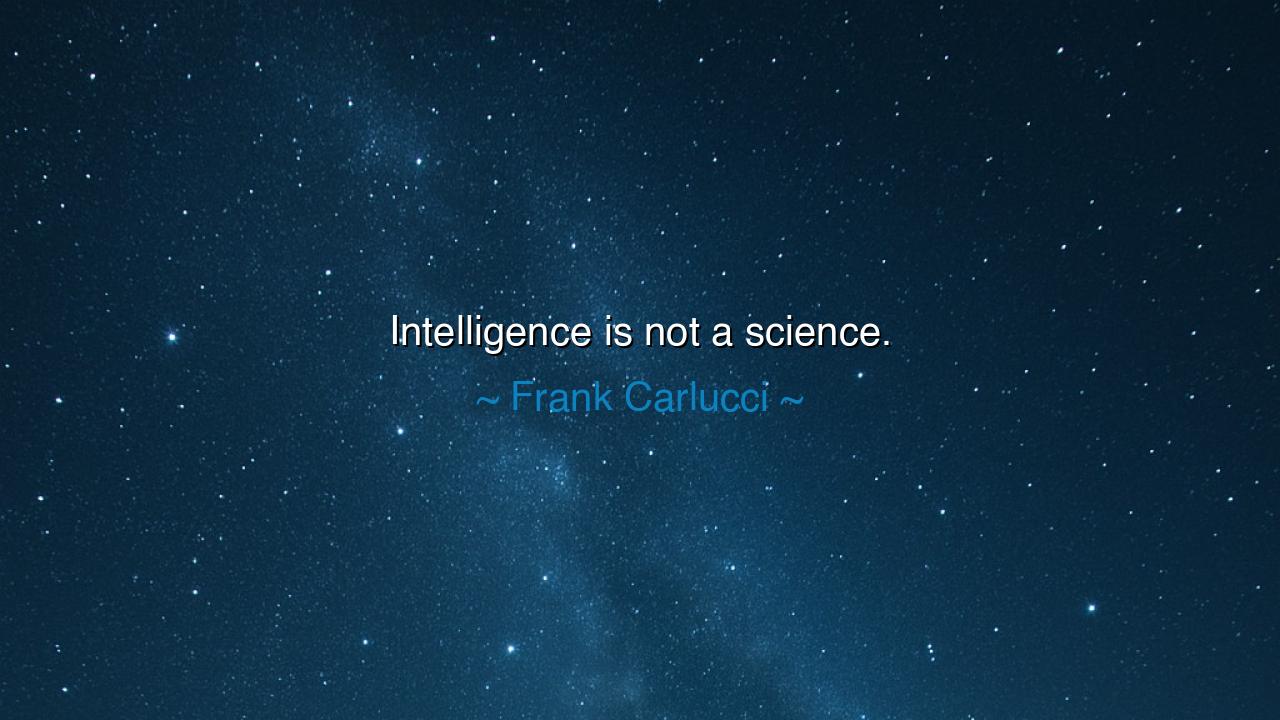
Intelligence is not a science.






"Intelligence is not a science." — Frank Carlucci
Thus spoke Frank Carlucci, the statesman and strategist who once stood at the helm of the world’s most intricate webs of power and secrecy. In this brief but weighty statement, he reveals a truth that cuts to the heart of both human reason and human nature. To say that intelligence is not a science is to remind us that knowledge alone does not make one wise, and that understanding the world requires not only logic and method, but also instinct, empathy, and moral discernment. Science can measure, predict, and explain — but intelligence, as Carlucci understood it, is a living art, shaped by judgment, experience, and the pulse of the human soul.
Carlucci, who served as the U.S. Secretary of Defense and was deeply involved in national intelligence, spoke from a lifetime of navigating uncertain terrain — the shadowed realm where nations compete and secrets breathe. He had seen how data, reports, and statistics could inform decisions but never dictate them. For intelligence, whether of nations or individuals, is not a machine that produces truth; it is a craft that interprets it. The wisest generals and leaders, he knew, are not those who possess the most information, but those who can discern meaning from it — who can see through the fog of contradiction and fear to the heart of reality.
To understand his words is to recognize the distinction between knowledge and wisdom. Knowledge is the domain of the scientist — gathered through instruments, experiments, and the laws of nature. But intelligence, in the sense Carlucci invokes, lives in the uncertain spaces between facts. It depends upon intuition, upon the reading of men’s motives, upon feeling the rhythm of events unseen. One may study all the sciences and yet fail to understand the soul of another human being. Intelligence requires not only a sharp mind, but a discerning heart — the ability to judge rightly when no equation will suffice.
The ancients knew this truth long before Carlucci gave it voice. Odysseus, the cunning hero of Homer’s Odyssey, was the embodiment of intelligence — not in the academic sense, but in the living art of adaptation. It was not strength or scholarly knowledge that guided him through storms and monsters, but cleverness, empathy, and instinct. He knew when to fight, when to yield, when to deceive, and when to trust. His intelligence was not science — it was wisdom forged by experience, sharpened by suffering, and guided by purpose. Like Carlucci’s world of diplomacy and strategy, Odysseus’s survival depended on understanding the unpredictable human heart.
Carlucci’s insight carries another lesson: that intelligence, in its truest form, is profoundly human. Science seeks certainty, but intelligence must live with ambiguity. Science builds systems; intelligence must navigate chaos. The scientist deals in what is known, but the intelligent mind operates where truth is veiled. This is why those who rely only on method may falter in leadership or in life — for life is not an experiment but an encounter. To act wisely, one must see with more than the eyes, and think with more than the brain.
Consider the great leader Winston Churchill, who during the Second World War faced endless torrents of information — reports, figures, and conflicting opinions. Yet what made him great was not the data he possessed, but the way he interpreted it. He combined logic with intuition, history with humanity, strategy with spirit. When others saw only numbers, he saw the movement of destiny. This is the art of intelligence — the capacity to balance reason with vision, analysis with faith. Churchill, like Carlucci, understood that no science could teach a man to feel the weight of a decision that might alter the course of the world.
And so, my child of reflection and purpose, take this lesson into your own life: cultivate not only knowledge, but intelligence. Learn from science, but do not let science become your master. Study facts, but also study hearts. Observe the patterns of the world, but listen to the quiet voice within. For true intelligence is not found in laboratories or libraries alone — it lives in the moments of decision, in the understanding of others, in the wisdom to act rightly amid uncertainty.
To be intelligent, as Carlucci teaches, is to be both thinker and feeler, student and judge, seeker and servant. It is to embrace the mystery of life without surrendering to confusion. Let your mind be disciplined, but let your spirit be free. For though intelligence is not a science, it is a sacred art — and to master it is to walk with insight through the labyrinth of the world, unafraid of the dark, yet ever searching for the light.






AAdministratorAdministrator
Welcome, honored guests. Please leave a comment, we will respond soon